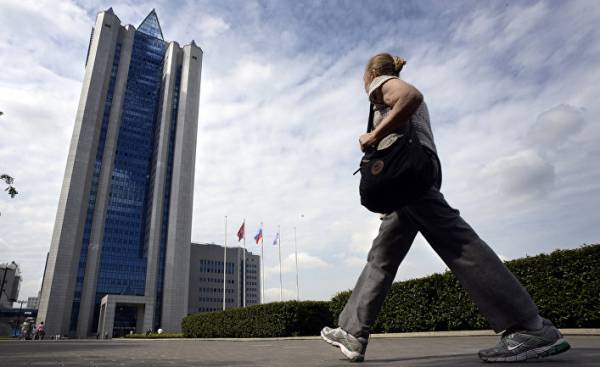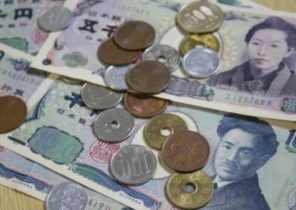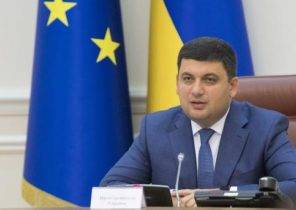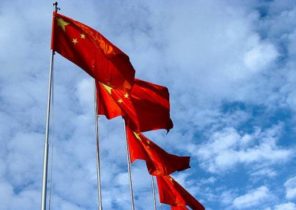
The game of Russia, seeking to deprive Ukraine as a key country through which Russian gas into Europe, entering in a crucial phase. The October decision on the OPAL pipeline contributed to the fact that Gazprom is actively engaged in the question of the status of existing and planned infrastructure. In the first place come here the political motives of the Kremlin, however, in Kiev there are chances to adjust plans of Moscow. Further developments around the Russian infrastructure projects will be an important factor that will be crucial not only for gas infrastructure in Europe, but also for the geopolitical situation on the continent.
Last year Gazprom supplied to the European countries (excluding former Soviet countries) 178,3 billion cubic meters of gas. The main route of export of blue fuel from Russia spoke Ukrainian, which was held 46% of the raw materials (82.2 billion cubic meters). The gas pipeline “Nord stream -1” (SP-1) European buyers received 43.8 billion cubic meters. The capacity of the pipeline “Yamal — Europe” and “Blue stream” was used by almost 100%. Last year’s data show that Moscow can reduce the transit through Ukraine, but only if it will build new pipelines.
Gazprom plans for diversification of supply routes to Europe is quite ambitious. The construction of “Nord stream-2” (SP-2) must increase the power from 55 to 110 billion cubic meters, and “Turkish stream” will supply 31.5 billion cubic meters of gas, half of which will be intended for the European buyers and the other half for Turkey. If Gazprom will be able to build the second branch “Northern stream” and fully utilize the throughput of SP-1 and SP-2, the profitability of Ukrainian transit will be called into question. In turn, the creation and use of “Turkish stream” will lead to such decrease of the importance of the Ukrainian direction, which would be tantamount to freezing. Before this, however, is still very far away.
Russian plans face many obstacles, but the game takes place simultaneously on several fronts. In the case of SP-1 and the hypothetical SP-2 the problem arises from insufficient capacity of the land tracks in Germany (OPAL and NEL gas pipelines). The question of accessibility of the Russian concern to the OPAL hung in the air after Warsaw filed about this lawsuit in the European court. Even if the final solution will meet the expectations of Moscow, and it will launch SP-2, problems will arise in any case. Now land the gas infrastructure in Germany allows you to send 56 billion cubic meters of gas per year, this is actually the only raw material which is sourced by SP-1. It should be added that such volumes can only be achieved if the full capacity of the OPAL gas pipeline (36 billion) and NEL (20 billion) would be reserved for supply to this area. Therefore, Moscow and its supporting community in Germany is so important to solve the second problem, which related to the continuation of NEL to Holland and the construction of the pipeline EUGAL in the direction of the Czech Republic and then Austria. EUGAL will increase the supply volume of 51 billion cubic meters. According to preliminary estimates, the creation of two new segments of pipeline on the territory of Germany will take from two to seven billion euros. Even if Gazprom will be able to approve such a project, he will face a number of challenges legal plan.
The third problem is SP-2 and European legislation. The topic has acquired special relevance after the letter that the Commission sent Sweden and Denmark. Its contents and statements of some European officials show that the European Commission has no clear position on the pipeline. It becomes clear that consent in its ranks no. It remains to be said that it is delaying the final resolution of the dispute, but the very appearance of the aforementioned letter was alarming phenomenon.
In addition, Gazprom has contractual obligations in respect of the countries of Central and southern Europe, and it can continue to perform them using only Ukrainian infrastructure, even after 2019. Finally coming to an end an antitrust investigation of the European Commission that Gazprom is trying to use as a tool in the negotiations with the EU, demonstrating that he is willing to take a constructive stance and to compromise.
Towards the building of SP-2, however, remains real, and the Russian monopoly, it seems, is determined to bring the project to the end. Quite possibly, an important element of this attitude are quasicorporations interests of contractors, for example, the companies of Russian oligarchs Gennady Timchenko and Rotenberg. Meanwhile, questions remain how the financial capabilities of Gazprom will allow him to implement all projects.
The topic of the “Turkish stream” now more questions than answers. Achieving the current agreement between Moscow and Ankara is very General and does not apply to the key aspects. In addition, we should not forget that the fate of this project depends on the development of political relations against the backdrop of events in Syria remain unstable. In the Russian expert community, including those close to the Kremlin, the prevailing view is that to build Turkey’s strategic gas relationship is risky. That this project will be started before the Russian-Ukrainian transit agreement will lapse, no.
Gazprom and its partners in the EU deliberately suppressed the value of the Ukrainian gas transmission system during periods of peak demand. It should be noted that last year’s good results supplies to Europe Gazprom is obliged to Ukrtransgaz. Such opportunities will not give any “North” or “Turkish stream”. The countries of the South of Europe in moments of peak demand could face serious challenges. While Gazprom will try to promote all projects to the maximum for the scale. This construction of the SP-2 and they receive special status, the construction of onshore infrastructure in Germany and access to the full capacity of the OPAL gas pipeline. Over time, as a compromise, Moscow could agree on the preservation of transit through Ukraine, however, its volume will be that Kiev will have to mothball a large part of the gas lines or even completely abandon their use.
Putin’s recent statement that Russia is interested in maintaining the transit is, first, a statement of fact that to stop it on January 1, 2020 is impossible, and secondly, a tactical move that aims to demonstrate “willingness to cooperate without political overtones” and to persuade politicians in the EU to ignore the political and geopolitical consequences of the construction of new pipelines.
The President of the company East European Gas Analysis Michael Korchemkin directly calls the project a waiver of the Ukrainian transit a bluff and a political game. It is sufficient to compare the current throughput of the pipelines through which gas goes to Europe (300 billion cubic meters, of which the Ukrainian direction — 178,5 billion real, or about 140 billion cubic meters) volume of gas that Gazprom exports to European countries, including Turkey (178,3 billion cubic meters in 2016) to understand that the rate of gas policy of Russia is devoid of economic rationality. The steps of the Kremlin come from political goals. He seeks to weaken Ukraine, to destroy the ties within the EU and to gain influence in Europe. If the policy of Gazprom is successful, it will be a serious blow to the interests and positions of countries such as Poland and Ukraine, as well as a factor that could undermine EU unity.
From the above we can draw several conclusions:
1. Gazprom has no chance to abandon the Ukrainian direction at the moment when the action of the Russian-Ukrainian transit agreement (1 January 2020). In the most optimistic for the Kremlin scenario, a transitional phase will take another two to three years.
2. The obstacles that complicate the implementation of Gazprom’s plans in life, so serious that he probably sets unrealistic goals to reach for the less daring by “compromise”, which in any case would be for Gazprom is very profitable.
3. A realistic goal towards Ukraine is the effort to reduce the volume of transit to the level of unprofitability, which will ultimately tip the scales in favor of the construction of pipelines bypassing Ukrainian territory.
4. While Gazprom tries to overcome the difficulties encountered with the construction of gas pipelines, Kiev has time for their own maneuvers.
On the transit of Russian gas Ukraine earns about $ 2 billion a year. This amount cannot be called minor, but the main problem with the restriction or suspension of the transit is different. If Gazprom will carry out their plans problems of technological nature related to the fact that one of the biggest systems in Europe will need to be balanced. If the volume of transit will be reduced, for example, up to 25-30 billion cubic meters a year, many sections of the pipeline will have to preserve, and some of them completely disassembled. The company has already taken the first steps to develop a plan of action if the need arises. According to preliminary estimates, the minimum profitability of the Ukrainian gas transportation system after preservation of small sections will ensure the transit of 40 billion cubic meters per year.
Kiev, however, is not sitting idly by, watching the actions of the Kremlin, and trying to disrupt his plans. A key focus began negotiations with three European companies that offered to join the venture, managing the Ukrainian GTS. The names of potential investors so far kept secret, but we can talk about the large companies. Ukraine is interested in the future investor belonged to the gas “Champions League”. First, if a strong European player will receive a share in the new company-operator of the GTS, Kiev can count on effective lobbying in the EU and European structures, which will limit the chances of Moscow to the successful conduct of its gas policy in Europe. Secondly, the Ukrainians will be easier to normalize the technical condition of the pipelines. Third, if on the side of Ukraine will be a strong player on the European gas market, he will be able to achieve more favorable terms in a new gas contracts with Gazprom after 1 January 2020 or even what the point of delivery of gas to European buyers will take on the Ukrainian-Russian border.
The logic of action of the management of Naftogaz simple, the idea was formulated recently, the head of the company Andrey Kobelev, saying that “nothing so fortifies a friendship as the total income”. If Kiev will be able to invite a serious investor, this will be a huge step towards safeguarding important transit role in Europe. This effort is justified especially in light of the fact that German companies continue to actively promote all the plans of Gazprom. Analyst at the Warsaw Centre for Eastern studies Konrad Poplawski (Konrad Popławski) in September last year drew attention to the special activity of the company Wintershall, which in recent months has only intensified. In particular, last week its representatives publicly accused Ukraine that its gas transportation system is inefficient. Against the background of growing volumes of gas that pass through Ukrainian territory, it looks, to put it mildly, untrue. In connection with such incidents, the steps of Naftogaz look meaningful and can allow Kyiv to succeed, i.e. to keep the important (though not exclusive) role in transit.
A very important signal in this context can be a Memorandum, which was signed in Rome on 10 April, Ukrtransgaz, the Slovak company Eustream and the Italian Snam S. p. A. They will hold a joint assessment of possibilities of using and strengthen the gas transportation system of Ukraine. The result will be an important factor, which will demonstrate the intention of Kiev regarding the fate of the GTS. Participation in the Slovak company Eustream — a good sign, which confirms that Kyiv and Bratislava to be a General view about the continued transit of Russian gas. The time for action on this direction is chosen correctly, in particular, in the context of the financial condition of Naftogaz, including Ukrtransgas. Net income of the operator GTS has made in the past year 28.7 billion hryvnia (more than a billion dollars), and it needs to attract partners.
Problems, however, in this way remains much. The main task is the successful and rapid liberalization of the gas market, in particular the holding of disaggregation — “unbundling”. It is also important, for example, to increase the independence of the regulator and the courts and to eliminate the monopoly of the company Group DF of Dmitry Firtash in the market of gas supply, because a liberalized market is an organism that can only work if all its elements are healthy. It’s a long and complicated process. And although Kiev seems determined, it is unknown whether all will go as planned reformers.
Worrying, for example, the latest personnel changes in the Ukrtransgaz or comments by the European Bank of reconstruction and development about the fact that the sector reform in recent years has slowed. There were also signs of a information campaign against supporters of the gas reform on the Dnieper river: the heads of Naftogaz Andriy KOBOLEV and Yuriy Vitrenko. This is another proof that the confrontation is increasing.
In addition, a direct impact on the liberalization process will have the result right to the end of the proceedings in the Stockholm arbitration in the case of contracts with Gazprom (including transit). It is expected that a decision will be made in June of this year (the verdict on contracts for the sale of gas at the end of April), and, apparently, will be the main event of the year in Ukraine. From the verdict depends on how attractive, will become the country for investors, as it, in particular, will determine the amount of financial obligations of Naftogaz not only for previous years, but also for the period until the end of 2019.
Do not forget about the ongoing Donbass war. The intensity of this conflict is not very big, however, it scares off potential investors who could invest in the Ukrainian GTS. The same effect despite the local scale provides an escalation of hostilities which, from time to time to provoke Russia.







